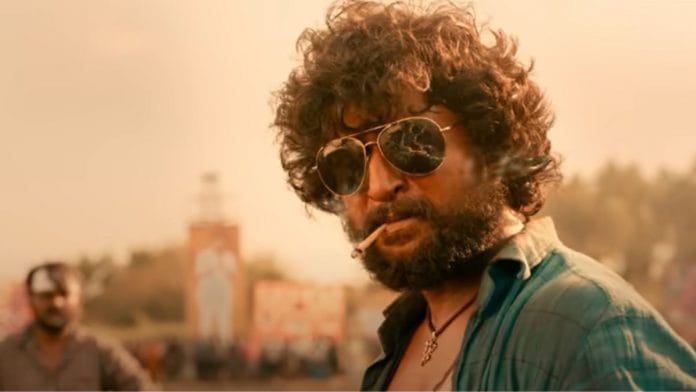Dasara is everything you would expect a standard masala entertainer to be. But the way debutant director Srikanth Odela has treated the predictable script and presented the natural star Nani sets the film apart.
The Telugu film has been dubbed in Tamil, Hindi, Malayalam and Kannada. Besides Nani, Keerthy Suresh and Deekshith Shetty play pivotal roles in the 156-minute film. The screenplay is penned by Jella Srinath, Arjuna Paturi and Vamsi Krishna P along with director Odela.
Set in 1995 in Telangana, the plot revolves around the village of Veerlapally where alcohol flows like water. The men are not just addicted to booze. It is embedded in their DNA. There is hardly a single shot of anyone drinking water. Life in the village happens in and around the infamous Silk Bar. But caste discrimination shuts the bar’s door for many in the village.
Dharani (Nani), Suri (Deekshith Shetty) and Vennela (Keerthy Suresh) have grown up together in Veerlapally. While Dharani and Suri are always covered in soot as they make money by stealing coal off moving trains, Vennela is a teacher at the village school.
The film graciously spends time in the first half to establish the characters and an avoidable love angle. The slow burn before the intermission and a predictable twist — with an unpredictable execution — in the plot puts the story in fourth gear. And makes way for an action-packed tale of vengeance in the second half.
An overarching theme of the Hindu festival Dussehra (Dasara in Telugu) and the triumph of good over evil runs like a background score in the film without being overwhelming. The local politics over the Singareni coal mines and symbolic authority over the bar drives the conflict further. Also, the way Odela deals with caste politics in a mainstream Telugu film is worth applauding.
Also read: Prakash Raj is the powerhouse performer of Vamsi’s ‘Ranga Marthanda’
Nani’s show
At one crucial moment, Nani pierces through a massive effigy of Raavan. It is visually stunning, to say the least. Besides his career-best performance, the biggest strength of Dasara is its cinematography by Sathyan Sooryan and Kolla Avinash’s production design. At no point does it feel like the whole film was shot at a set. In a dance sequence shot at night, Nani is surrounded by background dancers who are dressed as miners. The headlamps with the dancers are the only source of light in the wide-angle shot, which makes for a beautiful scene. Nani, with oodles of swagger and star power, owns the sequence.
In another scene, he slashes goons left, right and centre by using two axes. It has an eerie similarity with MCU superhero Thor, who keeps his Stormbreaker in one hand and Mjolnir in another.
Nani is at his best. During a cricket match in the film, he lights up his beedi —something he does often — by just swiping it against his loincloth. Unkempt hair, soot-laden face and body, shabby clothes, and goggles— Nani embodies Dharani’s spirit impeccably as he hits one ball after another outside the park. Even in the emotional scenes, he doesn’t falter.
The biggest disappointment comes in form of Keerthy Suresh’s character arc. While she is vivacious in the first half and performs a noteworthy dance sequence, she sits, and then sits some more, and sits again in the second half. Having an actor like her on board and not using her skills exhaustively seems like an unwise call. Deekshith Shetty surprises at several junctures and makes his Tollywood debut count.
The music by Santosh Narayanan is too loud at times, which overcooks an otherwise decent emotional or action scene.
All in all, Dasara has the potential to become the next blockbuster coming out from the Telugu film industry. And from the looks of it, it is already on its way.
(Edited by Ratan Priya)






